#The Grapes of Wrath
Text
There is a crime here that goes beyond denunciation. There is a sorrow here that weeping cannot symbolize. There is a failure here that topples all our success. The fertile earth, the straight tree rows, the sturdy trunks, and the ripe fruit. And children dying of pellagra must die because a profit cannot be taken from an orange. And coroners must fill in the certificate- died of malnutrition- because the food must rot, must be forced to rot. The people come with nets to fish for potatoes in the river, and the guards hold them back; they come in rattling cars to get the dumped oranges, but the kerosene is sprayed. And they stand still and watch the potatoes float by, listen to the screaming pigs being killed in a ditch and covered with quick-lime, watch the mountains of oranges slop down to a putrefying ooze; and in the eyes of the people there is the failure; and in the eyes of the hungry there is a growing wrath. In the souls of the people the grapes of wrath are filling and growing heavy, growing heavy for the vintage.
John Steinbeck, The Grapes of Wrath
1K notes
·
View notes
Text
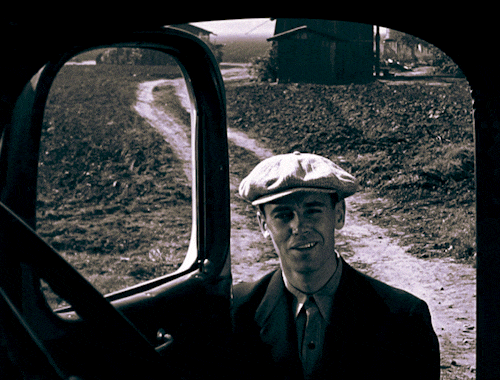



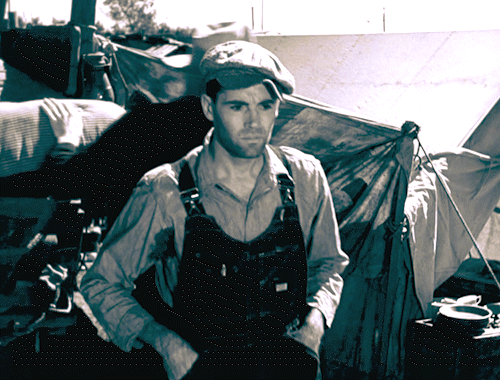




John Steinbeck was particularly enamored with the performance of Henry Fonda as Tom Joad, feeling that he perfectly encapsulated everything he wanted to convey with this character. The two became good friends. Indeed Fonda did a reading at Steinbeck's funeral.
HENRY FONDA in THE GRAPES OF WRATH (1940) | dir. John Ford
#1940's#1940's cinema#the grapes of wrath#henry fonda#john ford#old hollywood#classicfilmsource#filmblr#filmgifs#classicfilmgifs#oldhollywoodedit#filmedit#john steinbeck#tom joad#mygifs#dramagif#dramaedit#drama#great depression#jane darwell
173 notes
·
View notes
Text
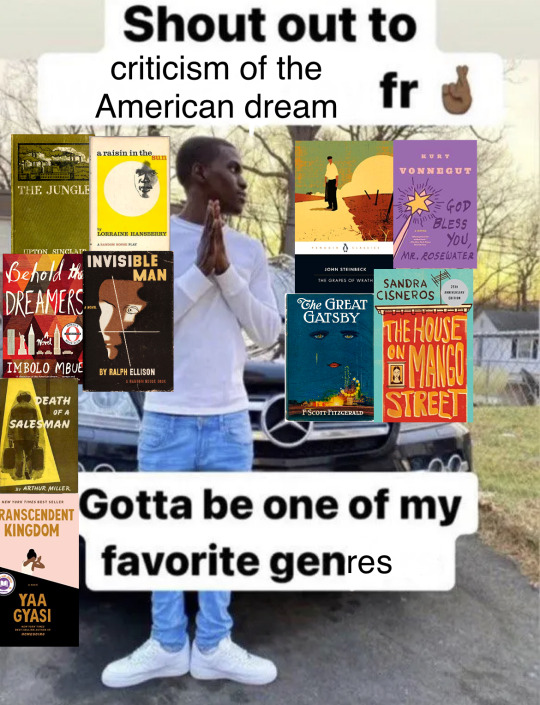
#hi#lup.txt#the jungle#a raisin in the sun#the grapes of wrath#god bless you mr Rosewater#behold the dreamers#invisible man#death of a salesman#transcendent kingdom#the great gastby#the house on mango street#upton sinclair#lorraine hansberry#imbolo mbue#ralph ellison#arthur miller#yaa gyasi#john steinbeck#kurt vonnegut#f scott fitzgerald#sandra cisneros
2K notes
·
View notes
Text
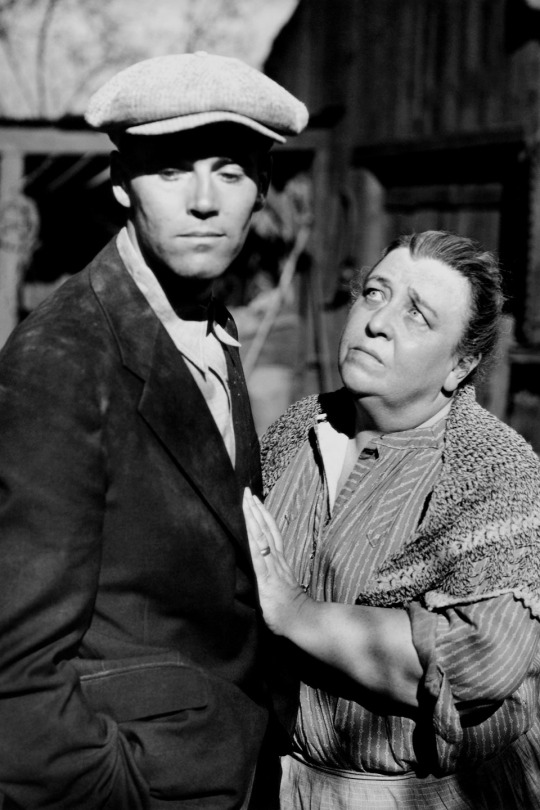
Henry Fonda and Jane Darwell in The Grapes of Wrath 1940 🧶
#old hollywood#beauty#romantic drama#historical drama#1940s cinema#henry fonda#jane darwell#john carradine#dorris bowden#the grapes of wrath#the dust bowl#the great depression#john steinbeck
112 notes
·
View notes
Text

John Steinbeck’s “The Grapes of Wrath” was first published on April 14, 1939
67 notes
·
View notes
Text
#I created this while I was crossfaded last night so#some of these aren't even because the book/story was good#beowulf changed me only bc this guy I thought was hot af acted him out for a class activity lol#I don't have a deep personal close relationship w the outsiders at all 😐#catcher grapes and Frankenstein you guys know you're stars. once again I do not know the outsiders#the outsiders#the catcher in the rye#the grapes of wrath#frankenstein#beowulf#the great gatsby#the crucible#to kill a mockingbird#polls#I could add a lot but these are the main bitches#honorary mentions: princess bride I know why the caged bird sings life of pi. honestly the epic of Gilgamesh too#Tuesdays with morrie too#basically every book in my 10th grade honors English class tbh the teacher killed it!!!!
87 notes
·
View notes
Text
I wonder whether you will remember one last piece of advice you gave me. It was during the exuberance of the rich and frantic twenties and I was going out into that world to try to be a writer.
You said, “It’s going to take a long time, and you haven’t any money. Maybe it would be better if you could go to Europe.”
“Why?” I asked.
“Because in Europe poverty is a misfortune, but in America it is shameful. I wonder whether or not you can stand the shame of being poor.”
It wasn’t too long afterwards that the depression came down. Then everyone was poor and it was no shame any more. And so I will never know whether or not I could have stood it. But surely you were right about one thing, Edith. It took a long time—a very long time. And it is still going on and it has never got easier. You told me it wouldn’t.
— John Steinbeck, in a letter congratulating his former creative writing professor at Stanford, Edith Mirrielees, for the paperback publication of her book, Story Writing.
Follow Diary of a Philosopher for more quotes!
#John Steinbeck#Edith Mirrielees#book quotes#writeblr#writeblr community#literature#lit quote#academia#dark academia#gradblr#studyblr#quote#quotes#literature quotes#classic literature#East of Eden#the grapes of wrath
81 notes
·
View notes
Text
The strategy to getting through classic literature is to be really weird about one character.
88 notes
·
View notes
Text
"Here is the node, you who hate change and fear revolution. Keep these two squatting men apart; make them hate, fear, suspect each other. Here is the anlarge of the thing you fear. This is the zygote. For here 'I lost my land' is changed; a cell is split and from its splitting grows the thing you hate--'We lost our land.' The danger is here, for two men are not as lonely and perplexed as one. And from this first 'we' there grows a still more dangerous thing: 'I have a little food' plus 'I have none.' If from this problem the sum is 'We have a little food,' the thing is on its way, the movement has direction. Only a little multiplication now, and this land, this tractor are ours. The two men squatting in a ditch, the little fire, the side-meat stewing in a single pot, the silent, stone-eyed women; behind, the children listening with their souls to words their minds do not understand. The night draws down. The baby has a cold. Here, take this blanket. It's wool. It was my mother's blanket--take it for the baby. This is the thing to bomb. This is the beginning--from 'I' to 'we.'
If you who own the things people must have could understand this, you might preserve yourself. If you could separate causes from results, if you could know Paine, Marx... Lenin, were results, not causes, you might survive. But that you cannot know. For the quality of owning freezes you forever into 'I,' and cuts you off forever from the 'we.'"
John Steinbeck, The Grapes of Wrath
336 notes
·
View notes
Text

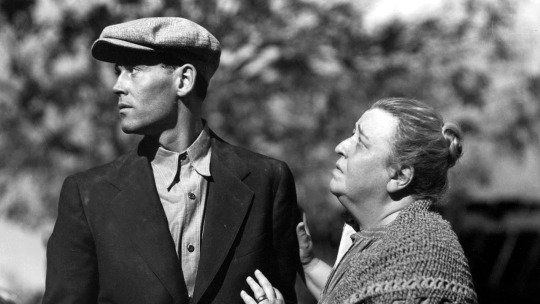
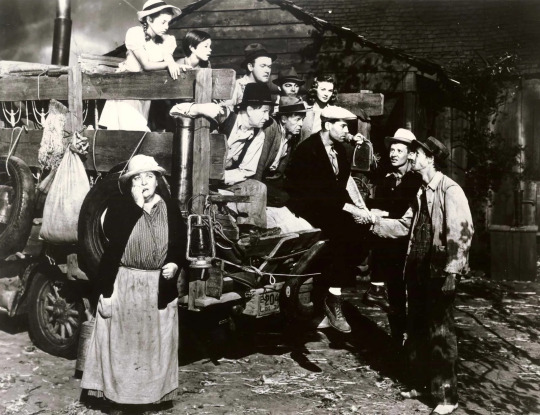
米国映画「The Grapes of Wrath(怒りの葡萄)」(1940)
原作:John Ernst Steinbeck
監督:ジョン・フォード
脚本:ナナリー・ジョンソン
出演:ヘンリー・フォンダ、ジェーン・ダーウェル、ジョン・キャラダイン、他
僕の中で、死ぬまでに一度は見なくてはいけない映画の1本であったアメリカ文学を代表する作品「The Grapes of Wrath」。
自然の猛威と不条理な資本主義に対する直接的な告発作品ともいえるこの映画を正月に、BSの放送大学で放送大学の教授による詳細な解説と共に放送されるこ���を知って早速テレビの前に・・。
1930年代末、アメリカ中西部を襲った干ばつをきっかけに、農業の機械化を進める資本家と貧困小作農民との軋轢を描いた映画。
主人公トム・ジョードとその家族のオクラホマにある農場はダストボール(砂嵐)によって耕作不能に。
彼らは、家財すべてを売り払いそのお金で買った古い中古車に乗り込み、移住先のカリフォルニアを目しルート66を辿る旅に出るが、年老いて病気がちな祖父や祖母はアリゾナ砂漠やロッキー山脈越えに耐えることができず命を落とし、従妹もあまりの過酷さに途中逃亡。
苦難の末、辿り着いた楽園カリフォルニアは大恐慌と機械化農業のために土地を失って職を求める多くのオクラホマ農民で溢れかえり、夢も希望も大きく打ち砕かれる・・。
彼ら移住者は、地元民から蔑まれながら貧民キャンプを転々とし、地主の言い値の超低賃金で、日雇い労働をするほかなかった。
やがて彼ら小作農民の不満と怒りは頂点に達し、一つの大事件が起こる・・。
最後の最後まで息子のことを想うママ・ジョードが泣けるし、最後にママ・ジョードが呟く「先の者が後にまわり、後の者が先頭になる」という新約聖書の言葉に胸が詰まる。
豊饒な「約束の地」であるカリフォルニアを目指すところは、旧約聖書のエクソダス「出エジプト記」をモチーフに、タイトルの「The Grapes of Wrath(怒りの葡萄)」は、ヨハネの黙示録の題材からとられたもので、神の怒りによって踏み潰される葡萄(人間)のことと解釈されています。
原作者のジョン・スタインベックはこの小説で1940年にピューリッツァー賞を受賞し、「The Grapes of Wrath(怒りの葡萄)」の総発売数は全世界で約1500万冊に。
この映画はアカデミー賞の監督賞、助演女優賞(ジェーン・ダーウェル)を受賞。
彼は、1962年にノーベル文学賞も受賞しましたが、受賞理由も本作の作品が決め手になったそうです。
33 notes
·
View notes
Text

october 29, '23: today's book mail!
#studyblr#reading#academia#studyspo#english literature#john steinbeck#the grapes of wrath#study notes#books#literature#studyspiration
43 notes
·
View notes
Text
And the great owners, who must lose their land in an upheaval, the great owners with access to history, with eyes to read history and know the great fact: when property accumulates in too few hands it is taken away. And that companion fact: when a majority of the people are hungry and cold they will take by force what they need. And the little screaming fact that sounds through all of history: repression works only to strengthen and knit the repressed. The great owners ignored the three cries of history. The land fell into fewer hands, the number of the dispossessed increased, and every effort of the great owners was directed at repression. The money was spent for arms, for gas to protect the great holdings, and spies were sent to catch the murmuring of revolt so that it might be stamped out. The changing economy was ignored, plans for the change ignored; and only means to destroy the revolt were considered, while the causes of revolt went on.
John Steinbeck, The Grapes of Wrath
51 notes
·
View notes
Text

“The works of the roots of the vines, of the trees, must be destroyed to keep up the price, and this is the saddest, bitterest thing of all. Carloads of oranges dumped on the ground. The people came for miles to take the fruit, but this could not be. How would they buy oranges at twenty cents a dozen if they could drive out and pick them up? And men with hoses squirt kerosene on the oranges, and they are angry at the crime, angry at the people who have come to take the fruit. A million people hungry, needing the fruit- and kerosene sprayed over the golden mountains. And the smell of rot fills the country. Burn coffee for fuel in the ships. Burn corn to keep warm, it makes a hot fire. Dump potatoes in the rivers and place guards along the banks to keep the hungry people from fishing them out. Slaughter the pigs and bury them, and let the putrescence drip down into the earth.
There is a crime here that goes beyond denunciation. There is a sorrow here that weeping cannot symbolize. There is a failure here that topples all our success. The fertile earth, the straight tree rows, the sturdy trunks, and the ripe fruit. And children dying of pellagra must die because a profit cannot be taken from an orange. And coroners must fill in the certificate- died of malnutrition- because the food must rot, must be forced to rot. The people come with nets to fish for potatoes in the river, and the guards hold them back; they come in rattling cars to get the dumped oranges, but the kerosene is sprayed. And they stand still and watch the potatoes float by, listen to the screaming pigs being killed in a ditch and covered with quick-lime, watch the mountains of oranges slop down to a putrefying ooze; and in the eyes of the people there is the failure; and in the eyes of the hungry there is a growing wrath. In the souls of the people the grapes of wrath are filling and growing heavy, growing heavy for the vintage.”
― John Steinbeck
[English Literature and Linguistics]
42 notes
·
View notes
Text

Outfit inspo✩‧₊˚
#💚#outfit inspo#coquette#green aesthetic#picture by me#bookblr#girlblogging#the grapes of wrath#literature
9 notes
·
View notes
Text
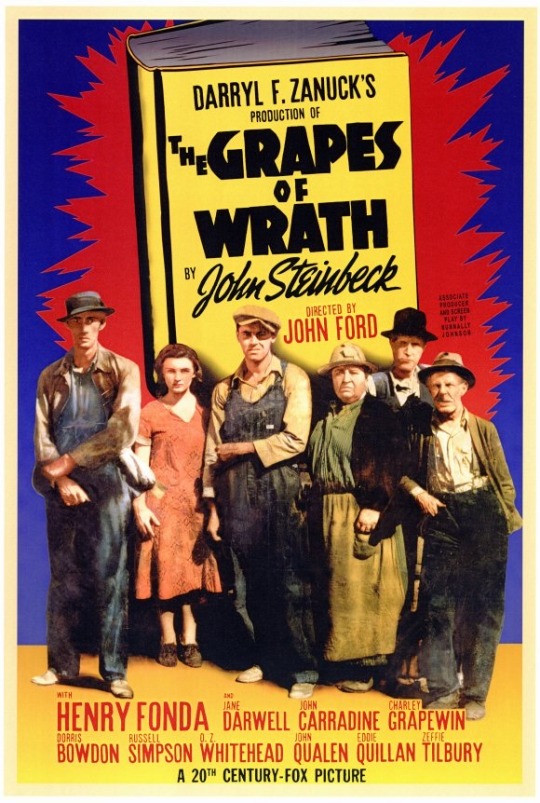

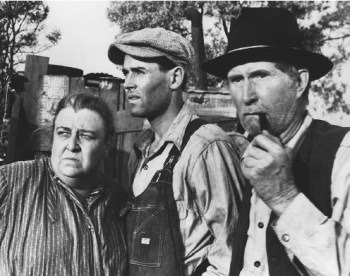



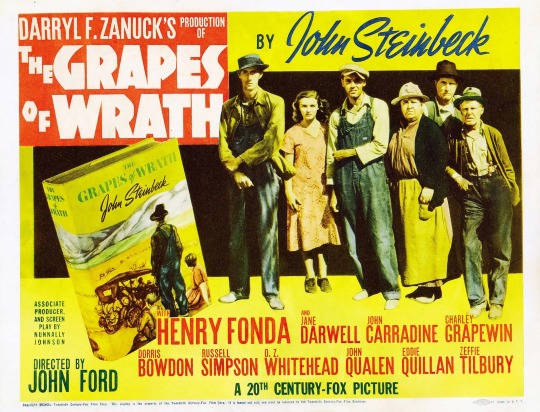
“… wherever there's a fight, so hungry people can eat, I'll be there.”
John Ford’s THE GRAPES OF WRATH premiered in Los Angeles today in 1940. #OnThisDay
54 notes
·
View notes
Text
Oscar Nominee of All Time Tournament: Round 1, Group A
(info about nominees under the poll)
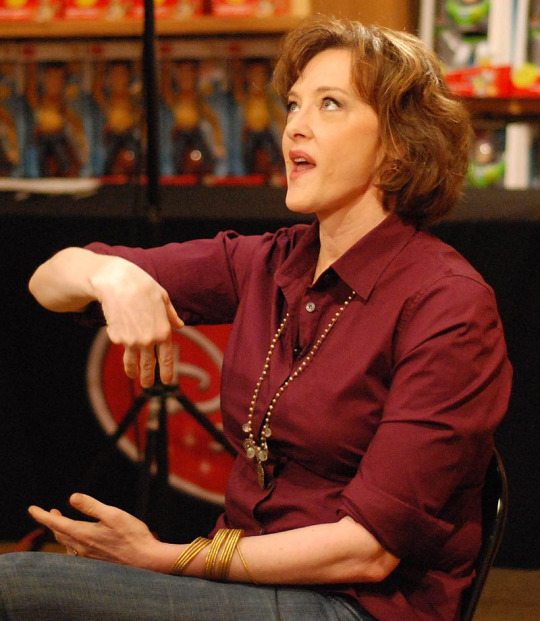

JOAN CUSACK (1962-)
NOMINATIONS:
Supporting- 1988 for Working Girl, 1997 for In & Out
--
JANE DARWELL (1879-1967)
WINS:
Supporting- 1940 for The Grapes of Wrath
#oscars#academy awards#oscar nominees#oscar winners#film#actors#joan cusack#jane darwell#working girl#working girl 1988#in & out#in and out#in & out 1997#in and out 1997#the grapes of wrath#the grapes of wrath 1940#nominees group a#nominees group a polls
8 notes
·
View notes